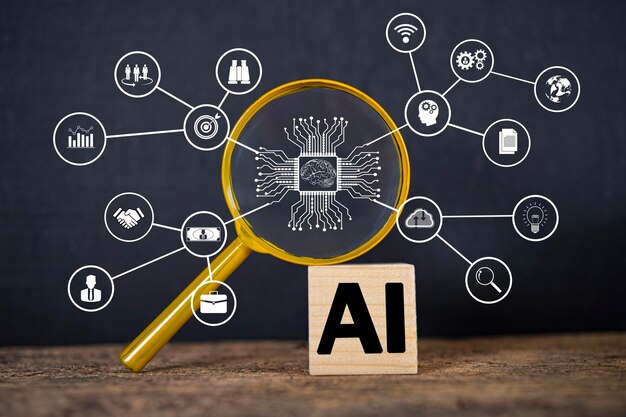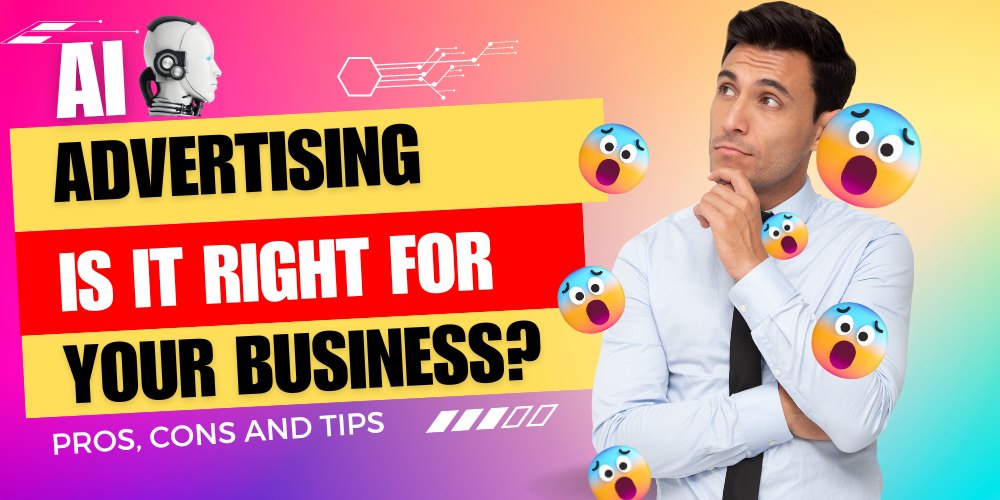AI Advertising: Is It Right for Your Business?
Introduction:
Because of technological improvements, advertising has evolved dramatically in today's digital age. Artificial intelligence stands as one of the most influential developments in the field of advertising. AI advertising utilizes clever algorithms and machine learning approaches to improve targeting, optimize campaigns, and provide customers with personalized experiences. This article goes into the notion of AI advertising, how it is used in an advertising environment, the benefits it provides, and the downsides it presents.
Exactly what is AI advertising?
The use of Artificial Intelligence technology in the creation of advertisements is referred to as AI advertising. AI advertising helps marketers improve their targeting skills, accelerate campaign administration, and ultimately provide more personalized and relevant ads to their target audience by using predictive algorithms and data analytics. Advertisers may use AI to analyze massive volumes of data and get actionable insights to optimize their advertising strategy.
How is the use of AI applied to advertising?
AI is being incorporated into numerous areas of the advertising process, transforming how advertisers interact with their target audiences. AI performs a critical role in the planning stages as well as post-campaign analysis.
Here are a few significant areas where AI is being used:
Here are a few significant areas where AI is being used:
1. Segmentation and targeting:
AI systems can find patterns and segmentation in consumer data and behaviours. Marketers can now design highly targeted ads geared to specific client segments, increasing the likelihood of involvement and conversion.
2. Content generation and optimization:
AI-powered systems can create and optimize ad content such as text, graphics, and videos. AI may offer creative components that resonate with the target audience by analyzing audience tastes and market trends, increasing the overall efficacy of the commercials.
3. Real-time bidding and ad distribution:
In real-time auctions, AI algorithms allow automated bidding and ad placement. AI can make rapid judgements to obtain ideal ad placements by analysing massive quantities of data and taking numerous criteria into account, such as user demographics, surfing behaviour, and ad relevancy.
4. Performance monitoring and optimization:
Artificial intelligence solutions deliver real-time statistics and insights into campaign performance. Marketers may use this data to optimize their advertising strategy, fine-tune targeting settings, and make data-driven decisions to maximize their ROI.

What are the advantages of AI advertising?
AI advertising provides various benefits to firms looking to improve their marketing efforts.
Let's look at some of the most important advantages:
Let's look at some of the most important advantages:
1. Enhanced personalization:
Marketers may use AI to provide highly personalized ads to specific users. AI algorithms can personalize information, messages, and offers to each user's particular tastes and interests by analyzing user data and behaviours. Personalization at this level improves user engagement, click-through rates, and conversion rates.
2.Higher efficiency:
AI simplifies and automates multiple advertising processes such as strategy planning, budget allocation, and optimisation. Marketers may save precious time and money by automating these operations, allowing them to focus on higher-level objectives and creative endeavors.
3. Better analytics:
Artificial intelligence (AI) provides marketers with a deep understanding of customer behaviour and preferences. AI systems may detect patterns, trends, and connections that might otherwise go unnoticed by analyzing massive volumes of data. These insights assist marketers in making data-driven decisions and improving their advertising tactics in order to better connect with their target audience.
4. Raised ROI:
AI advertising assists firms in increasing their return on investment. Advertisers may more efficiently deploy their resources by employing AI's targeting skills and optimisation algorithms, ensuring their advertising reaches the most appropriate audience. Furthermore, AI-powered analytics enable marketers to discover areas for improvement, enhance campaigns, and optimize advertising spend for optimal ROI.
What are the disadvantages of AI advertising?
While AI advertising has several benefits, it is critical to understand the possible negatives before completely accepting this technology.
Let's look at some of the issues:
Let's look at some of the issues:
1. Cost:
Putting AI-powered marketing tools and platforms in place could be expensive. These tools need a large investment in both technical infrastructure and qualified staff. Small firms with low funds may find it difficult to fully utilize AI advertising.
2. Data security:
AI advertising is primarily dependent on customer data, which raises privacy problems. The collection and analysis of vast volumes of user data creates ethical concerns and necessitates careful adherence to data protection standards. Businesses must prioritize data security and privacy, ensuring that they have strong safeguards in place to protect client information from unauthorized access.
3. Bias:
AI systems are only as accurate as the data on which they are trained. Biases in the training data might result in incorrect or mistaken ad targeting. Marketers must be on the lookout for evidence of bias in their AI advertising efforts and take the required actions to tackle and reduce these biases to guarantee equality and acceptance.
Know More << 14 Smart Ways To Repurpose Content And Get More Traffic>>
Tips for Using AI Advertising
1. Create clear goals:
Before entering into AI advertising, it's critical to create clearly defined campaign goals. Determine your goal for your commercials, whether it's to raise brand awareness, generate leads, or drive sales. Clear objectives give direction and aid in measuring the effectiveness of your advertising activities.
2. Use of the appropriate data:
To properly use the potential of AI advertising, be sure you're using the correct data. Determine appropriate, precise, and up-to-date information for your target audience. Quality data improves the precision of AI algorithms and raises the likelihood of providing relevant and engaging advertisements to your target audience.
3. Test and optimize:
Starting an AI advertising campaign is a continuous process. Test and optimize your campaigns on a regular basis, depending on performance indicators. Key performance indicators (KPIs) like click-through rates, conversion rates, and return on ad spend (ROAS) should be monitored. With this data-driven approach, you can discover areas for improvement and make the required changes to maximize advertising effectiveness.
4. Collaborate with a reputable partner:
If you are new to AI advertising or have questions regarding its implementation, consider working with a reputable partner who specializes in AI advertising solutions. Such collaborations give you experience and direction in properly exploiting AI technology, ensuring that your advertising goals are met efficiently.
Conclusion:
Artificial intelligence in advertising has huge potential for organizations of all kinds, allowing them to improve their targeting, productivity, and overall marketing efficacy. Marketers may provide personalized and relevant ads to their target audience, optimize their campaigns, and acquire important insights into consumer behaviour by using AI algorithms and machine learning techniques.
However, before incorporating AI advertising into your marketing approach, you must assess the positives and downsides. Consider the expenses, the consequences for data privacy, and the necessity for regular monitoring to correct any biases. Businesses can use the potential of AI advertising to achieve development and success in the changing digital market by making smart decisions.
However, before incorporating AI advertising into your marketing approach, you must assess the positives and downsides. Consider the expenses, the consequences for data privacy, and the necessity for regular monitoring to correct any biases. Businesses can use the potential of AI advertising to achieve development and success in the changing digital market by making smart decisions.

